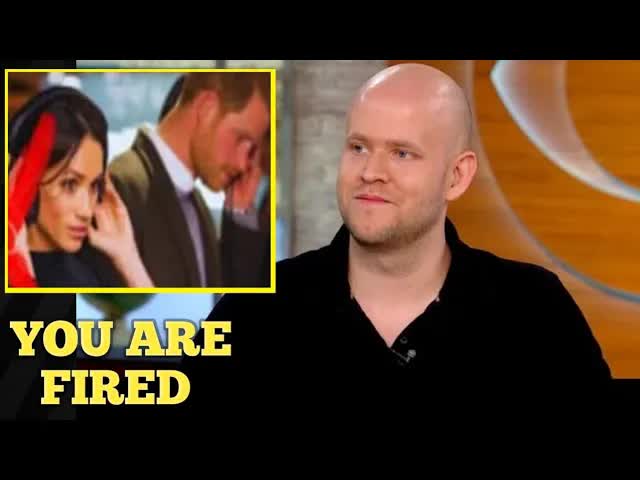The News
Prince Harry and Meghan Markle’s $25 Million Podcast Fiasco: A Cautionary Tale
In a shocking turn of events, Prince Harry and Meghan Markle's much-hyped partnership with Spotify has come to an abrupt end, leaving many to wonder what went wrong.
Originally celebrated as a groundbreaking collaboration, the couple's podcast, Archetypes, quickly morphed into what some are calling a $25 million disaster.
This incident not only reveals the pitfalls of celebrity partnerships but also highlights the intense scrutiny that accompanies high-profile projects.
When Spotify first announced its deal with the Duke and Duchess of Sussex, expectations were sky-high.
Archetypes was poised to delve into societal biases and celebrate the diverse stories of women, promising a fresh take in the crowded podcasting arena.
Fans were eager for the launch, but behind the scenes, tensions were brewing that would eventually lead to their termination.
As Harry and Meghan embarked on their new roles as media producers, it became evident that their vision for the podcast did not align with Spotify's ambitious goals.
Initial excitement soon gave way to disappointment as reports surfaced indicating that the content was failing to engage listeners as anticipated.
What began as a promising venture quickly turned into a struggle for relevance.
Spotify had invested significantly in the couple, banking on their star power to attract a large audience.
However, as time passed, download numbers for Archetypes fell flat.
Conversations on social media about the episodes were lukewarm, prompting Spotify executives to reassess whether their investment was justified.
As the weeks turned into months, the growing disconnect between the streaming giant and the Sussexes became increasingly apparent.
Internal discussions at Spotify intensified, leading to high-stakes meetings that ultimately sealed the couple's fate.
The final straw came when it became clear that the production quality of the podcast was lacking.
Reports indicated that episodes were being rushed out, missing the polished finish that Spotify had envisioned.
Creative disagreements between Harry, Meghan, and the production team further exacerbated the situation.
Amid mounting pressure, Spotify was also eyeing a significant expansion of its podcasting division, seeking exclusive deals with major entertainment figures.
With such lofty aspirations, the company could not afford to be weighed down by a faltering project.
Consequently, the decision was made to part ways with the Sussexes, marking the end of a partnership that had initially generated considerable buzz.
The announcement sent shockwaves through the media landscape, with headlines proclaiming the $25 million debacle.
Speculation ran rampant regarding the implications of this fallout, not just for Harry and Meghan, but for the broader context of celebrity partnerships in the streaming era.
Social media erupted with commentary that ranged from disbelief to schadenfreude, reflecting a swift shift in public sentiment.
As the dust settled, Prince Harry and Meghan found themselves at a pivotal crossroads.
They had stepped away from royal duties to forge a new identity as influencers and content creators, yet this setback threatened to undermine their aspirations.
Their reputation, already scrutinized due to their departure from royal life, took another hit, with critics pointing to this failure as evidence of their struggles to adapt.
Looking back at this tumultuous saga, it's essential to recognize the lessons learned.
The media and entertainment world is unforgiving, especially when stakes are as high as $25 million.
Celebrity partnerships require not only star power but also a clear vision, flawless execution, and the ability to adapt to feedback.
For Harry and Meghan, navigating this challenging landscape will be crucial as they aim to redefine their brand.
The fallout from their Spotify deal raises pressing questions about the nature of celebrity in today's society.
Are audiences still captivated by royal figures, or has the novelty worn off?
In a time of rapid content consumption and endless options, how can public figures maintain their relevance and engagement?
As we continue to follow their journey, one thing is certain: the world will be watching closely to see how they rebound from this setback and what new ventures lie ahead.
This story transcends a failed podcast or a lucrative deal gone awry; it reflects the challenges faced by those who dare to step outside their traditional roles and take risks in the ever-evolving media landscape.
Whether this marks the end of Harry and Meghan's podcasting aspirations or serves as a stepping stone for future successes remains to be seen, but their journey is far from over.
In the wake of their firing, public reaction and media coverage exploded, dominating headlines and social media feeds.
The incident captured the attention of royal watchers and casual listeners alike, generating a whirlwind of commentary that reflected a spectrum of opinions.
Initially, many fans were in disbelief, struggling to comprehend how their much-anticipated podcast had ended so abruptly.
Social media platforms lit up with reactions ranging from shock to disappointment.
Supporters expressed concern for the couple, emphasizing the challenges they faced in navigating the complexities of the media landscape.
Meanwhile, critics seized the moment, reveling in the couple's misfortune and questioning their ability to thrive outside the royal family.
Memes circulated, poking fun at the perceived irony of their situation.
Mainstream media outlets quickly picked up the story, dedicating segments to analyze the fallout.
Experts discussed the implications for both the Sussexes and the podcasting industry, dissecting the details of their contract and speculating about the financial and reputational costs associated with the firing.
This level of scrutiny underscored the intense public interest in their journey, highlighting how Harry and Meghan had become polarizing figures in contemporary culture.
As speculation swirled, sources close to the situation began leaking information suggesting that creative differences and lackluster engagement were key factors in the breakdown of the partnership.
Critics questioned whether Harry and Meghan had underestimated the demands of producing high-quality media, further complicating their public image.
The narrative surrounding their transition from royalty to media personalities became increasingly fraught as the reality of their situation set in.






























































